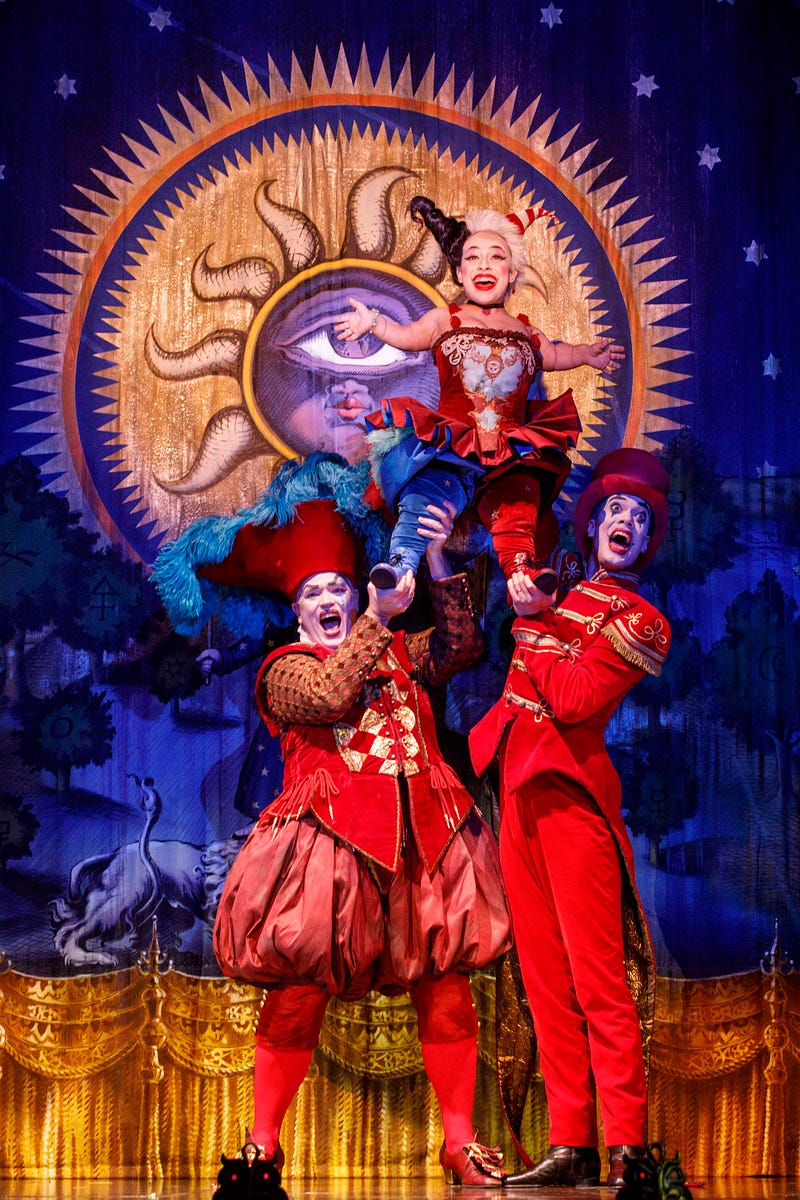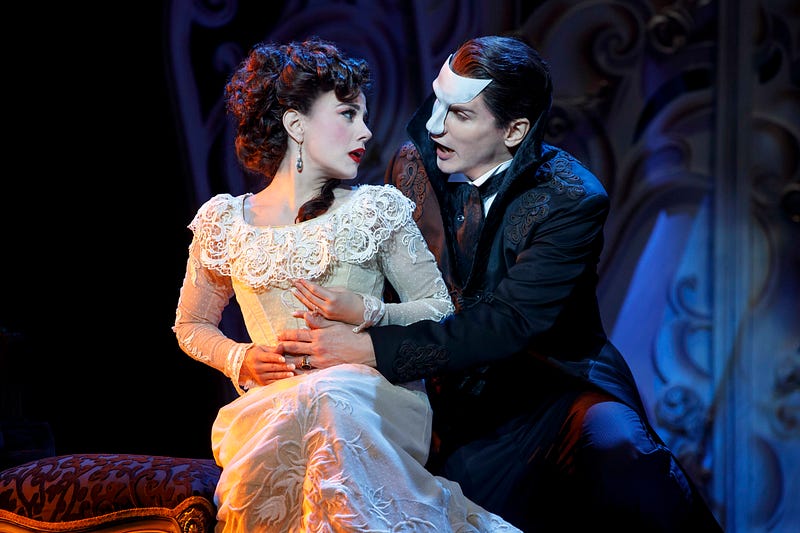
Within the first fifteen minutes of Love Never Dies, composer/producer Andrew Lloyd Webber’s expectedly soapy, surprisingly satisfying sequel to The Phantom of the Opera, the visual stimuli verge on overwhelming: Lavishly costumed clowns, wooden roller coaster tracks, high-kicking chorus girls, technicolored wigwork, and an ingenius steampunk limousine cum tricycle.
Designer Gabriela Tylesova’s elaborate sets and costumes keep this production — seen in San Jose and continuing a debut U.S. tour through September — in near-constant motion. The audience is whirled into the vortex of Coney Island, 1907 where The Phantom (Gardar Thor Cortes) has fled from Paris, believed dead by his beloved Christine (Meghan Picerno), accompanied by his opera house co-conspirator Madame Giry (Karen Mason) and her ingénue daugher, Meg (Mary Michael Patterson).
The disfigured, depressive baritenor works as the organ-playing proprietor of a sideshow under the nom de ‘tom Mister Y — a sobriquet no less obvious than anything else in the purposefully melodramatic book by Ben Elton (We Will Rock You, the Queen jukebox musical).
In summoning up a mass-appeal entertainment, Elton never metaphor he didn’t like.
So, right on-the-nose, there’s a hall of mirrors, a profusion of masks, and a troupe of earnest, marginalized, Phantom-adjacent outsiders (including little person Katrina Kemp, whose resume boasts playing Chucky the Killer Doll at a theme park).
And while there’s no wire walker among the circus acrobats here, the whole of Love Never Dies is an exquisitely balanced tightrope act: By keeping heads high, performances fully committed, and vocals flawlessly beautiful, the consummately professional cast keeps the whole spectacle from plummeting into the lip-licking maw of camp.
Yes, the frisson of suspense one feels during the second act emerges from old school love triangle and child-in-peril plotting, but for seasoned theatergoers it also comes from wondering when the whole soufflé of emotional anguish will collapse. It doesn’t, dear reader. It stands tall. And its delicious.

The story, set a decade after the original Phantom, finds Christine — now a world-renowned star — arriving in New York for an engagement sponsored by Oscar Hammerstein accompanied by her hard-drinking lout of a husband, Raoul (Casey Lyons) and musically gifted ten-year-old Gustave (played alternately by Casey Lyons and Jake Heston Miller). Upon arrival in Manhattan, the whole clueless family is sneakily spirited off to the Phantom’s domain (Just the first of two kidnappings in this unapologetic potboiler).
Miller, who performed the child’s role on opening night in San Jose, is a bell-clear singer — up to the standards of the adult leads — and has acting chops to boot: His carefully modulated facial expressions felt genuine in the midst of the musical pomp, adding a warm touch of psychological relatability.
Making his U.S. debut in the demanding role of The Phantom, Cortes — a native of Iceland primarily known as an opera singer — displays impressive range and stamina, taking powerful ownership of Webber’s long melodic lines. But it can’t be ignored that many audience members, perhaps unaccustomed to operatic vocalizing, were clearly distracted by — and even giggled at — his prodigious output of airborne saliva. Cortes is a veritable Fountain of the Opera.
As Christine, Picerno offers a fine mix of tenderness, terror and resolve. And stalwart Broadway and cabaret performer Karen Mason finds more depth in elderly Madame Giry than is written into the role, adding a further bit of authenticity to the proceedings.
Musically, if you’re a fan of Phantom, you’ll find much to enjoy here, particularly the title tune, the Phantom-Christine duet “Once Upon Another Time,” and the touching mother-son song “Look with Your Heart.” That said, there’s no tune with the super-sticky traction of “The Music of the Night” or “All I Ask of You,” and having brief passages of the original score quoted in the en’tracte and overture accentuates the lack. Still, the nearly sung-through production is more concerned with creating a transporting sonic ambience than generating earworms, and at this it succeeds.
Unlike the still-going-strong original Broadway production of Phantom — in which the smooth flow of director Hal Prince’s staging elegantly harmonizes with Webber’s lush but lugubrious score — the quick, kinetic visual shifts overseen by director Simon Phillips and choreographer Graeme Murphy in Love Never Dies provide an energizing counterpoint to the musical gloom and swoon.
From a visual perspective, the version of Phantom now touring the U.S. to celebrate the show’s 30th Broadway anniversary strikes an unhappy medium between the original and Love Never Dies, busied up and blinged out for no apparent reason other than novelty. Of the two shows on the road, the sequel is the superior. It would be no surprise to see Love Never Dies follow its doomed lovers and make its own way to Manhattan.
